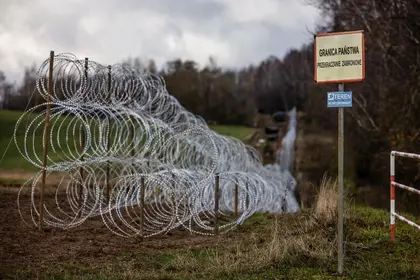“One of Vladimir Putin’s strategic weaknesses is that he is an irredentist, or an individual who advocates the restoration to their country of any territory formerly belonging to it. Putin’s war with Ukraine is constructed around an irredentist argument, but there are fundamental problems with this approach. A key issue is how one defines what territory should be included within Putin’s irredentist definition of Russian territory.”
The Russian Ukrainian war continues to reveal major and significant failings in the ability of the Russian government to formulate, implement and evaluate strategy. The scale of this weakness is surprising. The Russian armed forces have experienced decades of inappropriate investment in military equipment and training with the outcome being that Russia has found itself involved in a long-term war with Ukraine.
JOIN US ON TELEGRAM
Follow our coverage of the war on the @Kyivpost_official.
One of Vladimir Putin’s strategic weaknesses is that he is an irredentist, or an individual who advocates the restoration to their country of any territory formerly belonging to it. Putin’s war with Ukraine is constructed around an irredentist argument, but there are fundamental problems with this approach. A key issue is how one defines what territory should be included within Putin’s irredentist definition of Russian territory? Does this include Finland, as this country was once part of the Russian empire over the period 1809-1917.

Russia Starts Mobile Bomb Shelter Production
There are two important points here. On the one hand, there is the length of time that a territory was held by another country and, on the other hand, is how that territory was acquired. On the time point, the argument would be that there must be a significant period, but how this is defined depends on the second point. The acquisition of a territory held by one country and its incorporation by military conquest into the territory of another country is counter to the United Nations Charter. Any country that has signed the UN charter must acknowledge this point as the implication is that any such territory should never be part of an irredentist argument.
The question then is in what ways does Putin’s irredentism reflect weakness in Russia’s ability to think and act strategically? There are many issues to raise here, but a key weakness is Russia’s inability to remain silent on territorial issues. In strategic terms, listening is often more important than talking and knowing when not to respond to an issue is an important strength. The Russian government too often makes unsupported statements, responds too rapidly and in anger, and makes statements that raise questions that are not in Russia’s long-term strategic interests.
In June 2022, Russia complained about a ban placed by Lithuania on the transit of goods to Kaliningrad. Kaliningrad is a Russian enclave on the Baltic Sea that is about 663 kilometres from mainland Russia. On 9 May 2023, Poland’s Committee on Standardization of Geographical Names Outside the Republic of Poland, a Polish governmental body, recommended that Kaliningrad – the city and the wider area – should be known under the area’s traditional name of Królewiec. The Kremlin’s spokesperson, Dimitry Peskov, reacted immediately to this proposal and declared that the ‘decision’ was a ‘hostile act’ and ‘bordering on madness.’ The Kremlin should have remained silent rather than reacting to what was only a proposal and a proposal that if implemented would have no strategic implications for Russia.
Russia has a major problem with Kaliningrad. This enclave is located between Lithuania and Poland and is a major transport hub, industrial centre but is also the headquarters of Russia’s Baltic fleet. The problem is that this territory can never be considered as part of Russia’s historic motherland. Until 1946, Kaliningrad was known as Königsberg, but the Soviet Union captured the city on 9 April 1945 – placing it under Soviet administration as part of the Potsdam Agreement.
Königsberg’s history can be traced to 1255; the city was founded on the site of a Prussian settlement and subsequently became the capital of East Prussia and was the coronation city of the Prussian monarchy. Between 1466 and 1657 the city was a Polish fief. Russia acquired Königsberg or Królewiec via conquest in 1945.
Putin’s irredentism is reflected in his construction of a narrative formed around his definition of a Russian motherland. Thus, to Putin, Ukraine is part of Russia’s motherland, and its territory must be returned to Russia. There are many problems with this argument as this applies to Ukraine. But how can Putin apply this argument to Kaliningrad as this territory was never part of Russia’s historic motherland and has only been Russian for 77 years?
Kaliningrad is a Russian geographical anomaly. Extremely compelling arguments could be made for this territory to become an independent city-state or even for this territory to be returned to its historic ‘motherland’. Russia would protest any such suggestion. My advice to the Kremlin is that they should avoid raising any issue regarding Kaliningrad. Every mention of Kaliningrad by the Kremlin reminds all with an understanding of European historical geography that this territory should never be considered as part of Russia’s historic motherland.
Irredentism must work in both directions with those following this approach adopting a definition of a territory that is best defined as one that is ‘pure’ or unadulterated. Thus, an irredentist should also advocate the restoration of all territories to the countries that they formerly belonged to. It is time for Putin, to apply this approach across Russia or alternatively he should accept that irredentism is a fundamentally unsound strategy. If he were to adopt the latter approach, then his first action should be to return all Ukrainian territory occupied by the Russian armed forces to Ukraine.
The views expressed in this opinion article are the author’s and not necessarily those of Kyiv Post.
You can also highlight the text and press Ctrl + Enter






